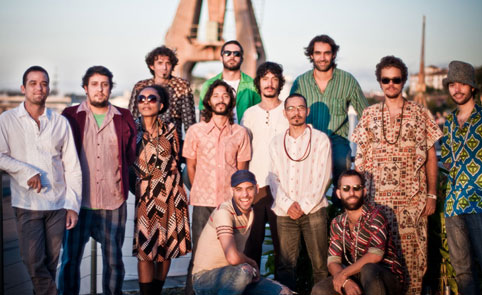
The first band of its kind in Brazil, the deeply funky Abayomy Afrobeat Orquestra finally have their first album under their belt and 2013 looks like being a breakthrough year for a group of musicians initially only united for a one-off gig by their love of Fela Kuti. Fittingly translating as 'Chance Encounter' in the Yoruban of West Africa, Abayomy's thirteen members gathered for a tribute to the Nigerian musical legend back in 2009 and have been jamming together ever since. Time Out Rio caught up with guitarist Gustavo Benjão to hear the story behind the group's debut album, and the secrets behind their funk.
So, 'Chance Encounter' - how exactly did the band come about?
Originally we were playing Fela Kuti covers at his anniversary party in 2009. The show was incredible, and we decided we had to start creating our own music. The fact that we were the first such orchestra in Brazil is neither here nor there, but I would like to think we have helped to nourish the afrobeat scene here. Soon after us, for example, the Bixiga 70 band emerged, flying the same flag as us, albeit not purely playing afrobeat.
How was it playing with Fela Kuti's guitarrist, Oghene Kologboele?
Kologbo is a genius, and one of the key elements of Fela's huge musical leap. Along with Tony Allen he is one of the people responsible for what we know today as afrobeat. We all learned from him, and he was extremely generous in sharing his creative process.
How did the connection with Lemi Ghariokwu, Fela's own album artwork designer, come about?
Our sax player Thiago Queiroz got in touch with him through Facebook and he was incredibly receptive to us. The cover is actually by Larry Isimah, one of Lemi's disciples, which he showed to us and we loved and thought it would be cool to work with a fresh talent.
The Abayomy sound also brings with it the songs and rhythms of candomblé. Where has this come from, and what other inspirations do you draw on?
From within, from our rich culture, the mixture of rhythms in our city. The music we make has its roots in afrobeat, but we were all born in Brazil and the musical baggage that we all carry is completely different from anywhere else in the world. Candomblé is part of our reality. We aways try to enrich our creative process with our own experiences and as such have created a peculiarly Brazilian version of afrobeat. We are thirteen people, and each of us has our own peculiarities and opinions.
Every show you do seems busier than the last, did you think that your sound would catch on the way it has done?
I think that is partly to do with the fact that people, especially young people, are paying more and more attention to African rhythms in general, since they are the roots of Brazilian music and there is some common ground there. I think there is an overriding need among young people to acquaint themselves with music that has a deeper meaning since, particularly in Rio, they are fed so much rubbish by the corporate entertainment industry. There is also the fact that our show is totally lively and danceable and appealing to young people from that perspective, so there are several factors working in our favour.
Who would be your dream guest to have on stage with you, and where would that be?
The name we always come back to in this respect is Gilberto Gil, and playing at The Shrine, Fela's venue.
Your album was recorded live in four nights, how did that work out?
We had already been playing these songs for a while and had them worked out, so that helped things a great deal. Abujamra (acclaimed composer André Abujamra) then came to cast a clinical eye and gave it a polish and was also a key part of the process. It was four days of a lot of work and a lot of fun, recorded live with just a few solos and the vocals added afterwards.
- Abayomy Afrobeat Orchestra's debut album is out now on iTunes
- The band play at Dia da Rua on 21 April



